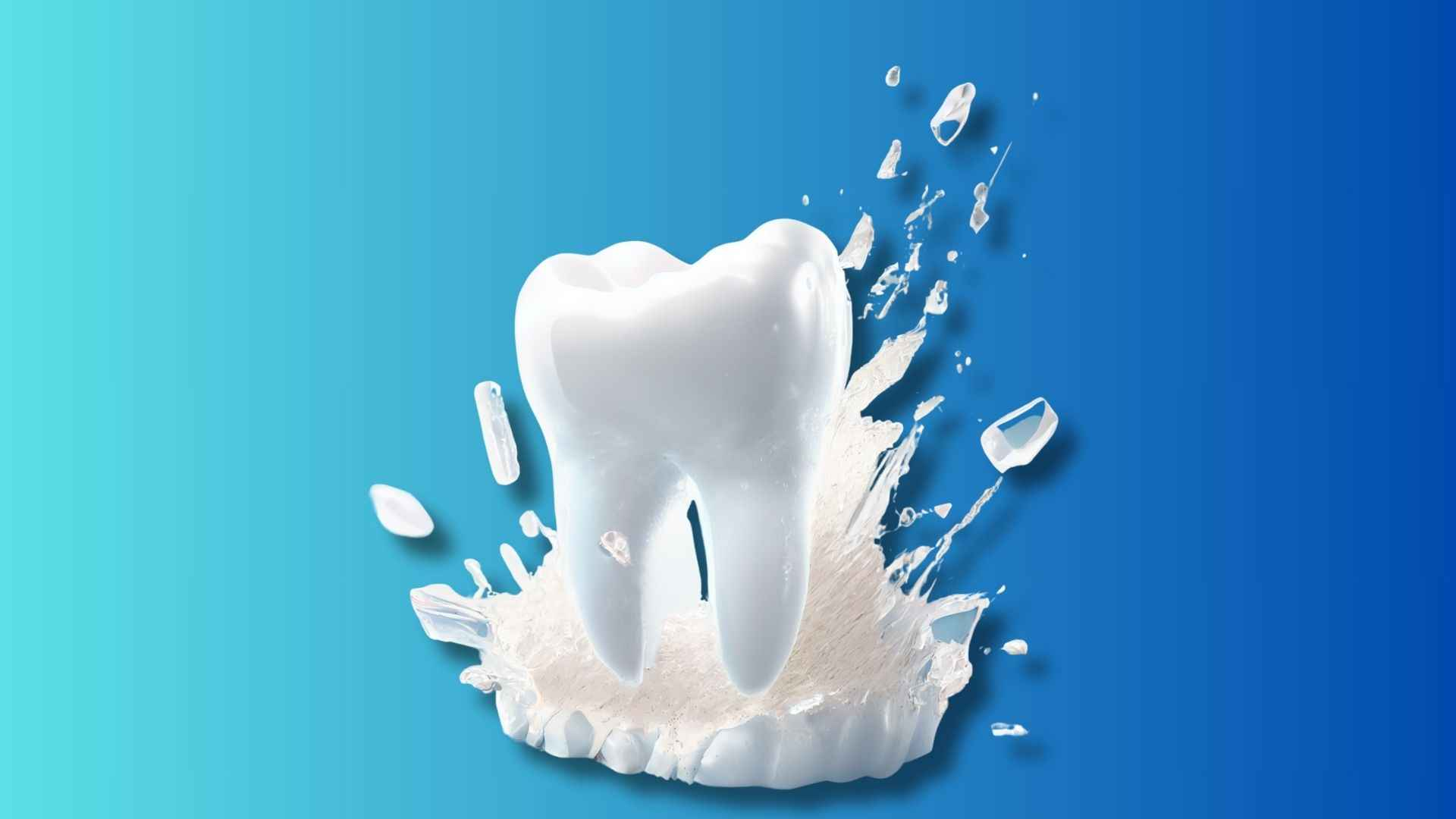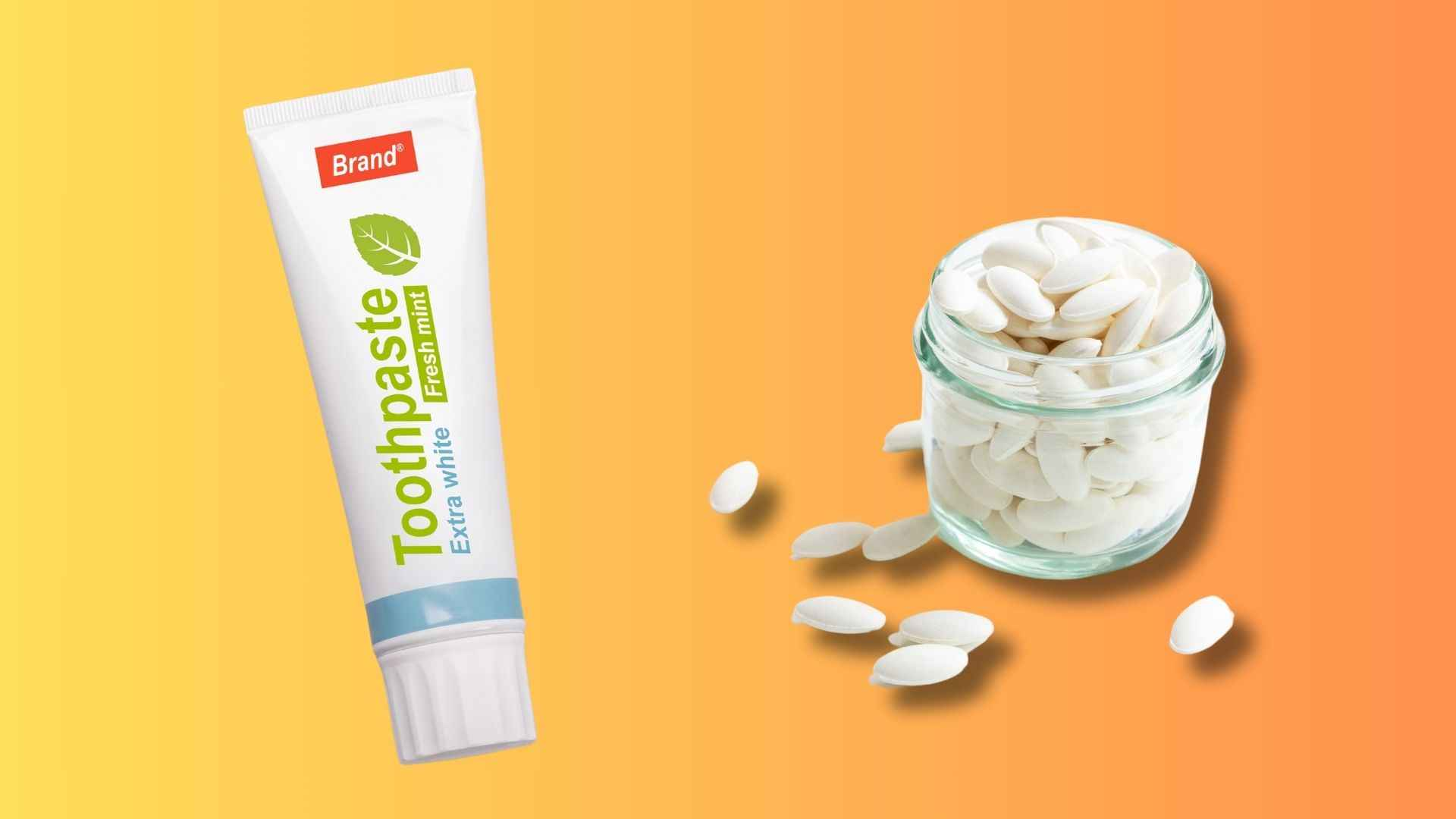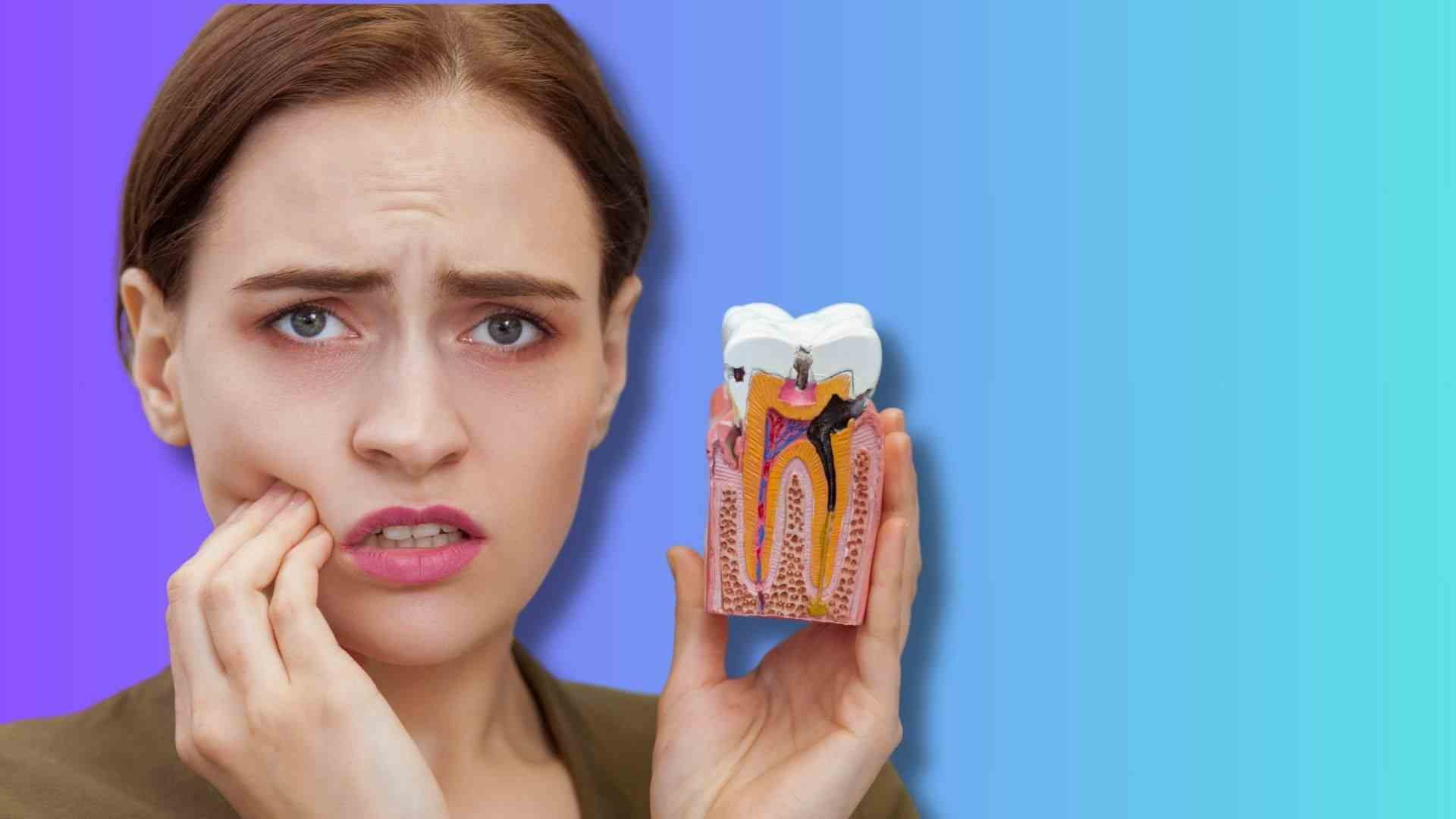Does Hydroxyapatite Whiten Teeth?
Yes, hydroxyapatite does whiten teeth.
While whitening toothpaste works by incorporating abrasive agents like silica or bleaching agents like hydrogen peroxide to remove surface stains on your teeth, hydroxyapatite toothpaste is a gentle and effective alternative.
Hydroxyapatite toothpaste whitens teeth by:
-
removing stains
-
preventing new stains from adhering to the teeth
-
increasing glossiness and hardness
and strengthen the enamel, making it less susceptible to erosion and decay.
The best part is that hydroxyapatite is safe too.
In this article, I'll explore the effectiveness of hydroxyapatite in teeth whitening and explain why you need it in your toothpaste.
What is hydroxyapatite?

Hydroxyapatite (also referred to as simply "HA") is a naturally occurring mineral that is the primary inorganic component of human teeth and bones.
It is a crystalline structure composed of calcium and phosphate ions, making it a vital component of the hard tissues in our bodies. In fact, hydroxyapatite gives our teeth and bones their strength and hardness.
In the context of teeth, hydroxyapatite is a key component of tooth enamel, which is the outermost layer of the tooth surface. Enamel is the hardest substance in the human body, and it protects the underlying dentin and pulp of the tooth.
Hydroxyapatite is also used in various dental and medical applications, including dental implants, bone grafts, and as a biomaterial in orthopedic surgery.
Further, in toothpaste, it has restorative properties that are not limited to its protective barrier alone; it also contributes significantly to the remineralization process, aiding in the repair of microscopic enamel imperfections that are invisible to the naked eye.
How does hydroxyapatite toothpaste work?

Because it is made of the same materials as your teeth, hydroxyapatite toothpaste works to prevent tooth decay by filling in your enamel with calcium and phosphate. This is a process known as remineralization.
A standard diet high in acid and sugar will slowly eat away at your enamel. Without intervention, your enamel erodes, and cavities form.
Dental experts use nano hydroxyapatite toothpaste to prevent this erosion through a process called remineralization and to improve your oral health overall.
Moreover, hydroxyapatite toothpaste can also work by preventing new stains from adhering to the teeth, increase glossiness and hardness, and strengthen the enamel, making it less susceptible to erosion and decay.
Hydroxyapatite Toothpaste and Remineralization
Hydroxyapatite toothpaste has remineralization properties that can help reverse early stages of tooth decay and strengthen enamel, resulting in a brighter appearance.
Studies have shown that hydroxyapatite particles in toothpaste can gently polish the surface of teeth, effectively removing surface stains caused by food, beverages, and tobacco. In fact, research has demonstrated the efficacy of hydroxyapatite toothpaste in remineralizing enamel lesions and preventing dental caries in children.
For instance, a double-blinded randomized clinical trial found that hydroxyapatite toothpaste can inhibit demineralization and remineralize enamel and dentin.
Plus, another research showed that toothpaste containing zinc hydroxyapatite had better remineralization potential compared to other toothpaste types.
That's why hydroxyapatite toothpaste stands as a promising solution for promoting remineralization and maintaining oral health, suitable for children, pregnant individuals, and most importantly, for everyone.
Does hydroxyapatite toothpaste whiten teeth?

Yes, indeed, hydroxyapatite toothpaste has been shown to contribute to the whitening of teeth.
While it may not be as potent as bleaching agents like hydrogen peroxide tooth whitening, it still can have a whitening effect.
In fact, the remineralization properties of hydroxyapatite help restore the natural whiteness of teeth by filling in microscopic defects and cracks in the enamel. Consequently, this results in a smoother and more uniform surface appearance.
Contrary to traditional whiteners, hydroxyapatite's approach to enhancing dental brightness doesn't rely on harsh chemicals or abrasives. Instead, this cutting-edge substance leverages the tooth-whitening effect inherent in its biomimetic composition.
Plus, unlike traditional whitening toothpaste, which can be too abrasive for your teeth, hydroxyapatite toothpaste gently polishes the tooth surface, effectively removing surface stains caused by food, beverages, and tobacco.
Therefore, while its primary function isn't solely focused on whitening, it can indeed lead to a brighter smile while also promoting overall oral health and freshness, thanks to its remineralization properties and its ability to balance oral pH.
Ultimately, why consider only the whitening effect when hydroxyapatite in your toothpaste offers numerous benefits for your overall oral health?
How Hydroxyapatite Toothpaste Whitens Teeth
Hydroxyapatite's role in dental whitening transcends cosmetic appeal, offering a fortifying boost to enamel integrity while it works to lift discolorations.
Now, let's delve into how hydroxyapatite toothpaste truly works wonders to whiten teeth through several mechanisms.
Remineralization
Hydroxyapatite can replenish lost minerals in the enamel, reversing early stages of tooth decay and strengthening the enamel, resulting in a brighter appearance.
In practice, as the hydroxyapatite particles fill in the microscopic ridges on the tooth surface, they reflect light more uniformly.
This not only contributes to the whitening of teeth but also to a notably brighter and more consistent tooth color. This mineral's natural affinity to the structure of the teeth is what makes it uniquely capable of executing this dual-action of whitening teeth while preserving oral health.
In comparing hydroxyapatite vs nano hydroxyapatite, nano hydroxyapatite toothpaste is shown to be more effective at remineralization than traditional hydroxyapatite.
Removing Stains
Hydroxyapatite particles in the toothpaste gently polish the surface of teeth, effectively eliminating stains caused by food, beverages, and tobacco.
Moreover, due to the microstructure of hydroxyapatite, it adheres effectively to the enamel surface, working to dissolve stains without requiring bleaching agents.
Of course, you should know how to prevent teeth staining in the first place too.
Preventing Staining
Over time, hydroxyapatite toothpaste not only removes existing stains but also helps to prevent new discolorations from forming, leading to a sustained, naturally white smile.
Increases Glossiness/Hardness
Hydroxyapatite promotes a smoother tooth surface, enhancing the glossiness of teeth and making them appear brighter. Additionally, it contributes to the hardness of the enamel, making it more resistant to damage and wear
Strengthens Enamel
Regular use of hydroxyapatite toothpaste can strengthen the enamel, making it less susceptible to erosion and other causes of tooth decay. This strengthened enamel not only contributes to overall oral health but also helps maintain a whiter appearance by preventing yellowing and discoloration.
For those intent on maintaining a brighter smile, hydroxyapatite toothpaste presents itself as more than just a passing trend in dental care. By aligning closely with the body's own materials, it stands out as a practical and beneficial alternative for those seeking to whiten their teeth without compromising on oral health.
Further, dental experts endorse the use of hydroxyapatite for individuals seeking a whiter smile, emphasizing its safety profile and protective benefits.
Hydroxyapatite Toothpaste vs. Fluoride Toothpaste

We often see hydroxyapatite and fluoride being used in toothpaste formulations, but how do these ingredients truly perform, and how do they differ from one another?
Mechanism of Action
Hydroxyapatite and fluoride take different approaches when it comes to protecting our teeth.
Hydroxyapatite toothpaste works by forming a new layer of hydroxyapatite on the surface of the tooth, which integrates into the natural tooth structure, strengthening and remineralizing it.
Meanwhile, fluoride toothpaste works by reacting with the saliva in your mouth to create fluorapatite, a substance that helps prevent tooth decay by promoting remineralization of tooth enamel.
Efficacy
When discussing the efficacy of hydroxyapatite and fluoride toothpaste, a distinction arises.
Numerous studies suggest that fluoride has long been effective in reducing caries due to its capability of integrating into the tooth enamel and fighting off harmful bacteria.
However, a recent study indicates that hydroxyapatite toothpaste is equally, if not more, effective in remineralizing initial caries lesions and reducing the formation of plaque.
Safety
While both fluoride and hydroxyapatite toothpaste are generally safe for daily use, there are certain considerations for each.
For instance, overconsumption of fluoride, especially in young children, could lead to dental fluorosis, fluoride toxicity, and more.
On the contrary, nano hydroxyapatite is biomimetic and safe as it is already a substance naturally present in our teeth, which makes it less likely to cause any harm when use.
Side Effects
While, both types of toothpaste are generally considered safe for regular use, excessive ingestion of fluoride can potentially lead to fluorosis- a condition that causes discoloration or spotting on the teeth.
Hydroxyapatite toothpaste, being an all-natural substance, does not have known side effects because it's a compound your body already makes, your teeth and bones are made of hydroxyapatite.
Therefore, considering factors for these both hydroxyapatite and fluoride toothpastes offer unique benefits.
The decision to choose one over the other often boils down to personal oral care needs and your dentist's advice.
Hydroxyapatite Toothpaste and Cavities

These cavities form when the enamel of the teeth is weakened by the acids produced by bacteria, leading to demineralization and, eventually, decay.
While you cannot remineralize a cavity once it has formed, hydroxyapatite prevents tooth decay
by replenishing the lost minerals, inhibiting demineralization, and contributing to remineralization.
Hydroxyapatite is made up of calcium and phosphate, elements that already make up the teeth, allowing them to absorb calcium and fill in any enamel fissures.
Research has shown that hydroxyapatite toothpaste is as effective as fluoride at preventing cavities, making it a valuable ally in the fight against tooth decay.
Is Hydroxyapatite Toothpaste Suitable for Sensitive Teeth?

Comparing Tooth Sensitivity After Using Hydroxyapatite
When it comes to reducing the discomfort associated with teeth sensitivity, hydroxyapatite toothpaste presents as a less irritating alternative compared to fluoride.
Traditional whitening toothpastes often contain chemicals like hydrogen peroxide that may lead to increased discomfort for those with sensitive gums and teeth.
In contrast, hydroxyapatite toothpaste, through its gentle and biomimetic nature, is designed to minimize such adverse reactions.
A key benefit of hydroxyapatite is its particle size. With hydroxyapatite nanoparticle closely resembling the building blocks of natural enamel studies suggest that they can provide effective whitening while being substantially less likely to cause gum irritation or heightened sensitivity during tooth brushing.
The Role of Hydroxyapatite in Reducing Dentin Hypersensitivity
For those suffering from dentin hypersensitivity, hydroxyapatite has been shown to offer notable relief.
Its nanoparticles work by filling in microscopic gaps in the enamel and dentin, effectively forming a protective layer over exposed nerve endings. This can significantly diminish instances of sharp pain triggered by hot, cold, or sweet stimuli—a common complaint among individuals facing sensitive teeth issues.
In essence, hydroxyapatite toothpaste not only promotes whiter teeth but also contributes to a reduction in teeth sensitivity, providing a dual-benefit that makes it a suitable option for many seeking oral health solutions that cater to sensitive dentition.
Other Benefits of Hydroxyapatite Toothpaste

Enamel and Dentine Remineralization
One in vitro study evaluated the effects of nano-hydroxyapatite (n-HAp) toothpastes on the remineralization of bovine enamel and dentine subsurface lesions. The study found that n-HAp toothpastes were effective in promoting remineralization of both enamel and dentine, presenting a promising alternative to traditional fluoride toothpastes.
Hydroxyapatite nanoparticles mimic the natural composition of dental enamel, aiding in the rebuilding of areas where enamel has begun to deteriorate. This proactive repair approach is essential for maintaining healthy enamel, ultimately resulting in stronger and more resilient teeth.
Prevention of Dental Caries and Plaque
Another standout feature of hydroxyapatite toothpaste is its ability to prevent dental caries and inhibit the development of plaque. As a supportive oral care ally, hydroxyapatite interacts with saliva and the biofilm on teeth to disrupt plaque formation, keeping cavities at bay and contributing to a healthier oral environment.
Fights Tooth Decay
Hydroxyapatite toothpaste has been shown to prevent and reverse cavities by binding with the teeth to rebuild enamel, increasing the enamel's hardness at the macro level, and preventing enamel erosion and demineralized enamel which can otherwise lead to cavities and tooth decay.
Studies have demonstrated that hydroxyapatite toothpaste is effective in preventing cavities and remineralizing teeth, making it a valuable ally in the fight against tooth decay.
Reduce Hypersensitivity

Enhancing Overall Oral Health
Dental hygienists often emphasize the importance of a holistic approach to oral care, and hydroxyapatite toothpaste neatly fits into this paradigm. Its broad-spectrum benefits amplify the state of oral health significantly, making it a recommended choice on sustaining a clean and vigorous mouth without the reliance on fluoridated products.
Incorporating hydroxyapatite toothpaste into your oral health regimen is an excellent way to maintain healthy oral health. It is also a great way to keep your mouth's microbiome balanced and your gums healthy.
By brushing with hydroxyapatite toothpaste daily, expandable flossing, tongue scraping and swishing with alcohol free mouthwash, you can sustain a clean and vigorous mouth without the reliance on fluoridated products.
Can I use hydroxyapatite toothpaste everyday?
Yes, you can use hydroxyapatite toothpaste every day.
Studies indicate that hydroxyapatite is a safe and effective mineral that can help remineralize tooth enamel, strengthening teeth and preventing decay.
In contrast to fluoride, hydroxyapatite works by directly rebuilding and restoring enamel, making it suitable for daily use without concerns about overexposure. It is gentle on the teeth and gums, making it ideal for those with sensitive teeth.
Using hydroxyapatite toothpaste regularly may also help reduce tooth sensitivity over time. This type of toothpaste is a great alternative for people who prefer fluoride-free options.
Summary: Hydroxyapatite Whitening Benefits

Additionally, hydroxyapatite toothpaste gently removes surface stains caused by food, beverages, and tobacco without relying on harsh chemicals.
It has an ability to prevent new stains and enhance glossiness and hardness contributes to long-term oral health and a sustained, naturally white smile.
Hydroxyapatite is truly a biocompatible and non-toxic alternative to traditional fluoride toothpaste, making it safe for daily use.
Overall, if you're looking for a safe, effective, and natural solution for achieving and maintaining a glowing smile, hydroxyapatite toothpaste is the way to go.
Frequently Asked Questions
Will remineralizing teeth make them whiter?
Yes, remineralizing teeth can make them appear whiter. Remineralization involves replenishing lost minerals in the enamel, which can help to strengthen and restore the tooth's structure. As a result, remineralization can improve the translucency and reflectivity of the enamel, giving the teeth a brighter and whiter appearance. Additionally, remineralization can help to reverse early stages of tooth decay and repair surface imperfections, further enhancing the overall whiteness of the teeth.
How long does hydroxyapatite take to work?
The time it takes for hydroxyapatite to work varies depending on its application. In dental hygiene products, benefits like smoother teeth and fresher breath may be noticed immediately, but enamel strengthening may take weeks to months. For bone repair, integration within the bone typically takes several months to years. In skincare and hair care products, improvements may become noticeable after several weeks of regular use. Individual responses may vary.
Can I use hydroxyapatite toothpaste everyday?
Yes, you can generally use hydroxyapatite toothpaste every day as part of your oral hygiene routine. Hydroxyapatite toothpaste is considered safe for daily use and can help strengthen tooth enamel, reduce sensitivity, and promote remineralization. However, it's essential to follow the instructions provided by the manufacturer and your dentist. If you have any concerns or specific dental conditions, consult with your dentist before incorporating hydroxyapatite toothpaste into your daily routine.
Should you rinse after hydroxyapatite?
It's generally recommended to avoid rinsing immediately after using hydroxyapatite toothpaste or mouthwash. This allows the hydroxyapatite particles to remain in contact with your teeth for a longer period, enhancing their effectiveness in remineralizing and strengthening tooth enamel. However, if you prefer to rinse, it's advisable to wait at least 30 minutes after brushing before rinsing with water to maximize the benefits of hydroxyapatite. Always follow the instructions provided by the manufacturer and consult with your dentist if you have any concerns or specific dental conditions.
How long should you leave hydroxyapatite on your teeth?
It's usually best to leave hydroxyapatite on your teeth for 20-30 minutes after brushing before drinking or eating. This allows the hydroxyapatite particles to adhere to the tooth surface and maximize their effectiveness in remineralizing and strengthening tooth enamel. After this period, you can resume your normal eating and drinking habits. However, always follow the instructions provided by the manufacturer and consult with your dentist for personalized guidance based on your dental health needs.
What happens when you remineralize your teeth?
When you remineralize your teeth, lost minerals like calcium and phosphate are restored to the enamel, strengthening and protecting it. This process helps reverse early signs of tooth decay, making teeth more resistant to future damage. As a result, your teeth become healthier, less sensitive, and better protected against cavities.
Can hydroxyapatite make teeth whiter?
Yes, hydroxyapatite can help whiten teeth by filling in tiny surface imperfections and restoring enamel, making teeth appear smoother and shinier. It also helps remove surface stains by gently polishing the teeth without damaging the enamel. While it may not bleach teeth like some whitening agents, it can improve the overall appearance of your smile.
What's the fastest way to whiten your teeth?
The fastest way to whiten your teeth is through professional teeth whitening treatments, such as in-office bleaching at a dentist. These treatments typically use stronger whitening agents that can provide noticeable results in just one session. At-home options like whitening strips or toothpaste with nano hydroxyapatite and baking soda can also show quick results, but they may take a bit longer to achieve the same level of whitening.
Where do you find hydroxyapatite?
Hydroxyapatite is found in human bones and teeth, as well as in some fish bones and coral. It is also commonly used in medical and dental applications for bone grafts and tooth care products.
What are the negatives of hydroxyapatite toothpaste?
There are no known negatives or side effects of nano hydroxyapatite in toothpaste. Research states that there is no literature reporting any systemic or adverse effects of hydroxyapatite containing toothpastes. In fact, that's why many people are turning to nano hydroxyapatite toothpaste as a safe, non-toxic alternative to fluoride toothpaste.
Can hydroxyapatite heal teeth?
Yes, hydroxyapatite can help remineralize and repair enamel in early stages of demineralization by replenishing lost minerals. It does not reverse cavities but can strengthen and protect teeth against further damage.
Is hydroxyapatite toothpaste good or bad?
Hydroxyapatite toothpaste is good for dental health as it helps remineralize enamel, reduce sensitivity, and prevent cavities. It is a safe and effective alternative to fluoride, making it suitable for those seeking fluoride-free options. Always check for reputable brands and consult your dentist to ensure it meets your oral care needs.
Is it safe to use whitening toothpaste everyday?
No, it's not safe to use whitening toothpaste every day, especially those with abrasive ingredients. Over time, they can wear down enamel and increase tooth sensitivity. It's better to use nano-hydroxyapatite toothpaste as it helps remineralize and strengthen enamel while providing a gentler whitening effect. Always consult your dentist for the best option based on your dental needs.






















